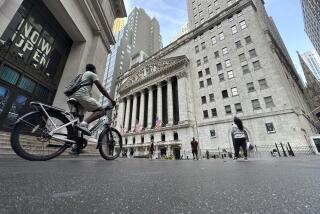Geithner doesn’t think Libor manipulation hurt taxpayers in bailouts
WASHINGTON -- Treasury Secretary Timothy F. Geithner told lawmakers Thursday that he doesn’t think manipulation of Libor by large banks cost taxpayers money when the benchmark interest rate was used to set some bailout terms, but officials are checking into it.
For the second straight day, Geithner defended his handling of concerns raised in 2008 that large banks were manipulating the London Interbank Offered Rate. Interest rates for trillions of dollars in consumer and commercial loans worldwide are set using Libor.
British investment bank Barclays last month agreed to pay $450 million to settle allegations by U.S. and British regulators that it manipulated the rate. Investigators are looking at whether other large banks also manipulated Libor to boost profits.
Sen. David Vitter (R-La.) criticized Geithner and other U.S. officials for using the rate in connection with some bailouts in 2008 when they knew it was vulnerable to misreporting.
“That was the best alternative available at the time, and you can’t say now with confidence that that choice in any way disadvantaged the American taxpayer,” Geithner said. “I think it’s quite unlikely, but we’re going to take a careful look at that.”
Geithner said that investigations have shown that banks manipulated the rate up and down, so it’s unclear what effect it had on money the Federal Reserve lent in the $182-billion bailout of American International Group and for a $1-trillion emergency lending program called the Term-Asset Backed Securities Loan Facility.
“We don’t know at this point what impact that behavior had [in moving] the rate up or down for investors or borrowers,” he told the Senate Banking Committee. “It’s possible that people who borrowed money were advantaged by this. It’s possible that people lent money were disadvantaged, but we don’t really know to the extent that happened.”
Geithner has taken heat from Republicans for his actions as president of the Federal Reserve Bank of New York in 2008 when it learned that the rate was vulnerable to manipulating and received evidence that Barclays was under-reporting its borrowing costs to bring down Libor as the financial crisis was brewing.
Geithner said he notified top U.S. officials, including the heads of the Treasury Department, Securities and Exchange Commission and the Commodity Futures Trading Commission, which launched the investigation that led to the Barclays settlement.
Geithner also sent recommendations for fixing Libor to the Bank of England and the British Bankers Assn., the private group that oversees the rate.
Three large U.S. banks -- Bank of America, Citibank and JPMorgan Chase -- are among the international financial institutions that set the rate in 2008. Vitter pressed Geithner about whether U.S. officials knew if any of those U.S. banks also helped manipulate it.
“We don’t know that,” Geithner said, though he directed Vitter to U.S. investigators for more details. The Treasury Department is not involved in the investigations.
Vitter was not happy with the answer.
“So we’re now over four years later and we haven’t answered that question. ... Doesn’t that unequivocally suggest somebody dropped the ball?” Vitter said.
Geithner said that such investigations are complex and take time to complete.
Sen. Patrick Toomey (R-Pa.) criticized Geithner for not warning state and local governments of the concerns about Libor, which they used to set rates on municipal bonds they issued.
“My concern is that knowing this rate did not have integrity, you nevertheless stood by while thousands of transactions were executed,” Toomey said. Geithner noted that concerns that Libor might be manipulated were widely reported in the media starting in early 2008.
Democrats defended Geithner, saying he raised concerns with top officials in the U.S. and Britain when he learned of the potential problems.
“You and the New York Fed were proactive,” said Sen. Charles Schumer (D-N.Y.). “I think the idea we did nothing for four years is obviously false and I think some are taking unfair shots at you.”
ALSO:
Libor rate-rigging scandal intensifies pressure on Wall St.
Barclays to pay more than $450 million in interest-rate settlement
Bernanke says LIBOR is ‘structurally flawed,’ defends Fed’s response
More to Read
Inside the business of entertainment
The Wide Shot brings you news, analysis and insights on everything from streaming wars to production — and what it all means for the future.
You may occasionally receive promotional content from the Los Angeles Times.











